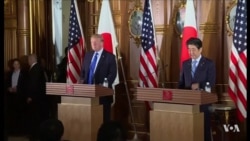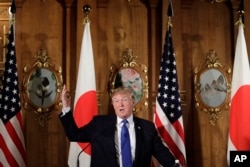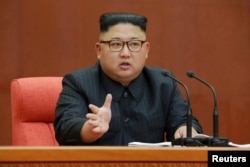Japan’s prime minister, standing alongside the U.S. president, borrowed a Donald Trump phrase on Monday, agreeing that “all options are on the table” when it comes to responding to North Korea’s weapons development.
Shinzo Abe, at a news conference with Trump at the Akasaka Palace in Tokyo, said there is “no point in dialogue for the sake of dialogue with North Korea” and the time has come to exert maximum pressure on Pyongyang.
WATCH: Steve Herman's video report
Abe and Trump, following a second day of meetings, confirmed that North Korea has been the dominant topic of their discussions.
The U.S. president called Pyongyang’s pursuit of the ability to place a nuclear warhead on an intercontinental ballistic missile “a threat to the civilized world and international peace and stability.”
Trump repeated that the era of strategic patience, in attempting to deal with Pyongyang, is over.
“Some say my rhetoric is strong, but look what’s happened with weak rhetoric over the last 25 years,” the president said criticizing the approaches of previous U.S. administrations. But he declined to answer a Japanese reporter’s question about whether he is prepared to go to war with North Korea.
The president was also asked about what fresh message he has for Kim Jong Un; the Reuters news agency reporter noting Trump’s response to a VOA question on Air Force One on the way to Japan in which he referred to the North Korean people as industrious and warm.
Trump also said North Korean leader Kim Jong Un, who he has belittled as “Little Rocket Man” should send back to Japan any surviving Japanese abducted by North Korean agents over decades.
“It would be a tremendous signal,” said Trump. The “start of something very special.”
Abe revealed during the joint news conference that on Tuesday he will announce his country will freeze assets of nearly three dozen North Korean groups and individuals.
The unilateral measures follow enhanced sanctions on North Korea placed by the U.S. Treasury Department and the United Nations.
Trump, in a pair of public pronouncements in Tokyo on Monday said he expects Japan will purchase “massive amounts” of American military equipment and some of it will enable Japan to shoot North Korean missiles “out of the sky.”
But former United States Director of National Intelligence and retired Navy admiral Dennis Blair tweeted that this is the time the U.S. should consult with Japan and South Korea about what the joint response would be to a North Korean nuclear missile launch into the Pacific.
He said a massive allied response would require all three countries to "increase their military readiness in case of a North Korean retaliation and take steps to provide civil defense in South Korea and Japan to protect their citizens and the tens of thousands of Americans who live in both countries."
Trump arrives in South Korea on Tuesday and is to address the National Assembly where he is expected to reaffirm the U.S. commitment to defend America’s ally against Pyongyang.
A nearly three-year war on the Korean peninsula in the early 1950s ended in a stalemate that pitted the United States, South Korea and the United Nations against North Korea, which was backed by forces from China and the Soviet Union.
No peace treaty was signed and the Korean peninsula has remained divided ever since.
North Korea makes frequent claims that the United States is seeking to reignite full-scale conflict.
State media in Pyongyang on Monday, referring to Trump, said that “no one can predict when the lunatic old man of the White House, lost to senses, will start a nuclear war” against North Korea.
North Korea says the situation strongly requires the country to bolster its nuclear deterrent and “the U.S. should not expect us to make any changes.”









